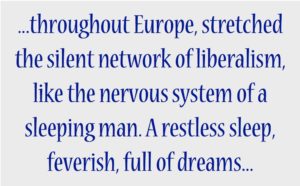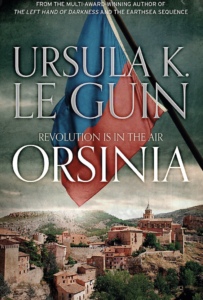Ursula K. Le Guin: “Throughout Europe, stretched the silent network of liberalism”
Novelist Ursula K. Le Guin passed away recently. In my teens I read nearly all her science fiction novels, and have read the Earthsea Trilogy many times since. The essay below (revised here) was written some years ago. — Greg Rehmke
He read the speech in which the orator called down the wrath of the people on the house of privilege, the speech that ended, “Vivro libre, ou mourir!”– Live free, or die. The yellow newsprint crumbled under the boy’s touch; his head was bowed over dry columns of words spoken to a lost Assembly by men over thirty years dead…The speeches were full of rant, cant, and vanity; he saw that clearly enough. But they discussed freedom as a human need, like bread, like water. — Ursula K. Le Guin, Malafrena
Stories for a Starting Place
A novel ordered on Amazon recently arrived and reminded me of early explorations in the world of true (or classical) liberalism. I started re-reading and was again swept away.
In middle school I read The Hobbit and Lord of the Rings each summer. It was a grand landscape of high adventure with higher meanings I didn’t quite understand. But like Homer’s Odyssey it was a place where boys (young Hobbits) through trying experiences became men (still hobbits, but tougher, more mature ones). I was a boy and becoming a man and I guess imagined orcs and goblins to fight in my future.
I read mostly science fiction in those years, having slowly graduated from Marvel comics. Wandering the house one evening, I asked my mother for more science fiction. She suggested Atlas Shrugged by Ayn Rand. I read it quickly, wondering at first about the amazing engine said to draw vast power from the Earth’s electricity. There was much more in Atlas Shrugged, but at 16 or 17, the bad guys and economic conflict were as alien to me as monsters in science fiction. Tolkien created a world of orcs and goblins that were by nature evil and elves that were by nature good. Men’s souls could be molded to live good lives or be seduced by evil. In Ayn Rand’s world men could become just as evil and just as bent on destroying all that was good in the world. It didn’t seem real to me at the time (but became real in college where I met people who claimed to believe anti-life philosophies that I had only read about in Atlas Shrugged). But Atlas Shrugged planted seeds of an alternate Earth where strong and silent people could oppose bad ideas and destructive policies.
I read most of Ursula K. Le Guin’s science fiction books. Her Earthsea Trilogy was captivating, as were other early anthropology-based science fiction novels. In 1980 a new book appeared entitled Malafrena (now part of Orsinian Tales and The Compelte Orsinia). When I put this book down I knew what I wanted to do, though had no idea how to do it.
Malafrena sounded like a mystical place I assumed would be science fiction or fantasy. Sinking into the story, I kept expecting a door to open to another world, or an ancient power to appear. Deep into the novel I walked through that door myself, into that other world. Readers step into a past of confusing struggles for freedom waged in Central Europe thirty years after the French Revolution. (I heard an historian say “the past is like another country.” So maybe the past in another country can be like another world.)
Le Guin’s Itale Sorde grew up in the provinces learning to manage his father’s estate, but surrounded by his grandfather’s books. At seventeen, home from boarding school, he begins one evening to read old French newspapers his grandfather had saved, turning to the year 1790. Le Guin writes:
He held the French Revolution in his hands. He read the speech in which the orator called down the wrath of the people on the house of privilege, the speech that ended, “Vivro libre, ou mourir!”– Live free, or die. The yellow newsprint crumbled under the boy’s touch; his head was bowed over dry columns of words spoken to a lost Assembly by men over thirty years dead…
The speeches were full of rant, cant, and vanity; he saw that clearly enough. But they discussed freedom as a human need, like bread, like water. Itale got up and walked up and down the quiet little library, rubbing his head and staring blankly at the bookcases and the windows. Freedom was not a necessity, it was a danger, all the lawmakers of Europe had been saying that for a decade. Men were children, to be governed for their own good by the few who understood the science of government. What did this Frenchman Vergniaud mean by stating a choice–live free or die? Such choices are not offered to children. The words were spoken to men. They rang bald and strange; they lacked the logic of statements made in support of alliances, counter-alliances, censorships, repressions, reprisals…
Itale then returns, in September of 1822, to college in the provincial capital. There he meets others and joins Amiktiya, a secret society,
They drank a lot of wine… passed contraband books around, discussed revolutions in France, Naples, Piedmont, Spain, Greece, talked of constitutional monarchy, equality before the law, popular education, a free press, all without any clear idea of what they were getting at, where it all led. They were not supposed to talk, so they talked. (p. 16)
A dinner conversation is described with Itale and his father and uncle discussing the coming meeting of Estates, the first in thirty years. The uncle hopes for local control of taxes: “They might be able to do something about taxation at least. The Hungarian Diet’s won back control over their taxes from Vienna.” But Itale’s father answers: “What if they did? Taxes won’t be decreased. Taxes are never decreased.” Itale replies, “The money wouldn’t go to support a foreign police force, at any rate.”
After college, it is time for Itale to return to his home in Malafrena. But instead he talks with his friends of going to Krasnoy, the capital, to fight, somehow, for freedom:
There must be men in the city who would welcome them and put them to work. There were said to be secret societies there, which corresponded with similar groups in Piedmont and Lombardy, Naples, Bohemia, Poland, German states: for through the territories and satellites of the Austrian Empire and even beyond, throughout Europe, stretched the silent network of liberalism, like the nervous system of a sleeping man. A restless sleep, feverish, full of dreams. … Itale went striding down the shady street like a summer whirlwind, his face hot, his coat open.. (Malafrena by Ursula K. Le Guin).
Malafrena is not about free-markets or libertarian ideas. As I recall Le Guin gives glimpses of horrific early industrialization and abuse of workers. Things were pretty terrible for many at the beginning of the industrial period. But industry work was usually better than available alternatives, including life on the farm. Otherwise people would have abandoned industrial labor and returned to the countryside and their old aristocratic masters. Surely some did, but most didn’t. The tens of thousands streaming into the cities of nineteenth century Europe–and to cities across the developing world today–suggest that city opportunities still shine.
(Early industrialization in Europe, following the destruction of the Napoleonic Wars, was especially dark. England had gone deeply in debt to pay for the war. All that wealth was destroyed and impoverished workers were taxed heavily to pay the debts. So things did get worse for many, but not because capitalism was somehow less productive or less fair, or was heading for an overproduction collapse.)
I read Malafrena in a fever similar to Itale Sorde’s, and wished as well to leave the provinces and join the fight for (classical) liberalism. After attending an Institute for Humane Studies seminar and visiting the Cato Institute (as close as there was at the time to secret societies) I applied for internships and later joined the Institute for Humane Studies to help with Liberty and Society seminars and a program for high school speech and debate students.
So now, decades later, I reread Ursula K. Le Guin’s novel that first started me thinking about joining “the movement.” And when homeschool debaters or students at IES-Europe Seminars write to ask about classical liberal ideas and internships (with today’s “secret societies”), I email back to recommend Malafrena, now long out of print, and Atlas Shrugged. — Greg Rehmke
 — Update: Malafrena is now back in print as part of Orsinia: Malafrena, Orsinian Tales (June, 2017)
— Update: Malafrena is now back in print as part of Orsinia: Malafrena, Orsinian Tales (June, 2017)
— Update 2: now included in The Complete Orsinia
